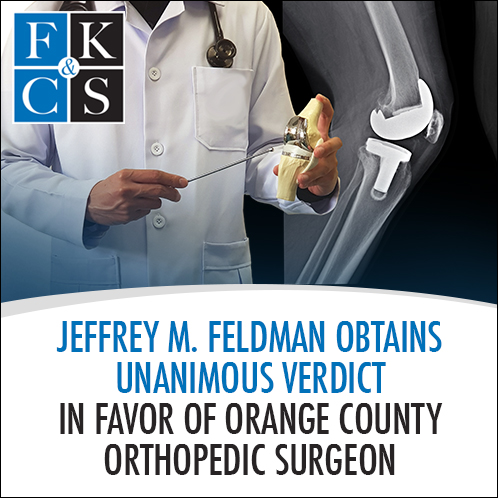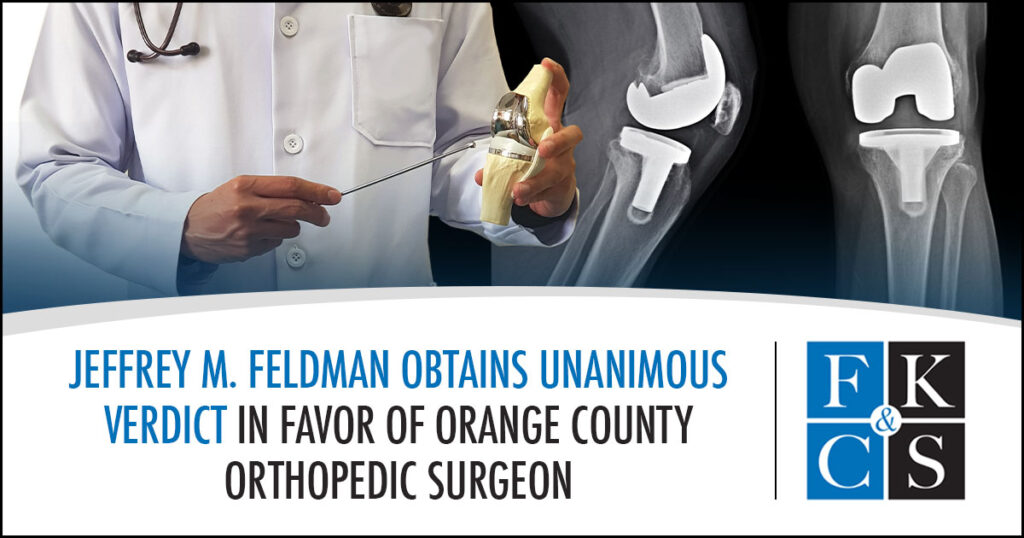 Jeffrey M. Feldman successfully defended an Orange County, NY orthopedic surgeon in a case involving the performance of a total knee replacement (TKR) upon a patient who had recently relocated from Orange County to northern Vermont. Feldman, Kleidman, Collins & Sappe LLP’s (FKC&S) client performed the TKR at Garnet Medical Center on October 7, 2019. The surgery was successful, and the patient was discharged home on October 8. Because of the long drive home, the patient was instructed to get out of her car at least every hour, to walk for 20 minutes, to perform ankle pumps in the car and to keep the foot elevated.
Jeffrey M. Feldman successfully defended an Orange County, NY orthopedic surgeon in a case involving the performance of a total knee replacement (TKR) upon a patient who had recently relocated from Orange County to northern Vermont. Feldman, Kleidman, Collins & Sappe LLP’s (FKC&S) client performed the TKR at Garnet Medical Center on October 7, 2019. The surgery was successful, and the patient was discharged home on October 8. Because of the long drive home, the patient was instructed to get out of her car at least every hour, to walk for 20 minutes, to perform ankle pumps in the car and to keep the foot elevated.
On post operative days two, three and four, the patient received at-home physical therapy. The therapist had concerns about the swelling of the patient’s leg due to the long ride home. After the third session of physical therapy, the patient had extreme pain and ultimately called an ambulance which took her to the University of Vermont Medical Center. Based upon a Doppler ultrasound due to calf pain, a clot was found in the patient’s peroneal vein. The patient was admitted and put on anticoagulants.
Four days later the patient was diagnosed with compartment syndrome (excessive swelling placing extreme pressure on the muscles in both the deep posterior and superficial posterior compartments of the calf). This required the performance of a fasciotomy, which would relieve the pressure in each compartment. Unfortunately, the compartment syndrome caused permanent injury to both the muscles and the nerves in the deep and superficial posterior compartments. During the performance of the fasciotomy, the surgeon noted that there was brisk pulsatile bleeding from the popliteal artery, which required one suture to repair.
The plaintiff claimed that FKC&S’s client injured the popliteal artery while performing the total knee replacement and that the patient continued to bleed from discharge through her admission to the University of Vermont Medical Center on October 12. The patient alleged that the bleeding from the popliteal artery resulted in the formation of an extensive hematoma, which placed pressure on both the deep and superficial posterior compartments leading to the compartment syndrome.
The plaintiff claimed that the muscles in both of the posterior compartments, as well as the nerves in those compartments, were permanently impaired resulting in the need for multiple subsequent operative procedures, the use of a brace, a foot drop and associated pain and suffering of the patient’s lower extremity.
In thoroughly analyzing the medical records, and with the assistance of experts in orthopedic surgery and vascular surgery, Feldman established that there was no popliteal artery bleed until after the patient’s admission to the University of Vermont Medical Center. The Doppler ultrasound, though of the veins, did not show the presence of a large hematoma (or any hematoma), proving that the bleeding was due to the anticoagulants and not the original operative procedure. In addition, the plaintiff’s expert, Glenn Whitted, MD, an orthopedist from Toldeo, Ohio, did not fair well under cross examination and was discredited by the jurors.
The jury returned a unanimous verdict in favor of FKC&S’s client in less than one hour, making it three verdicts in a row that Feldman obtained in less than an hour each.

